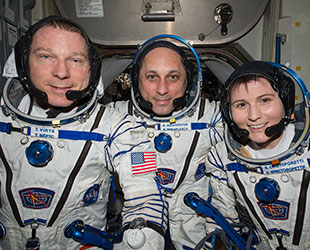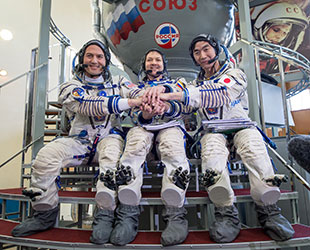May 12, 2015 – Two astronauts and a cosmonaut onboard the International Space Station won't be returning to Earth this week as the result of a Russian cargo spacecraft that failed to reach the orbiting outpost late last month.
NASA astronaut Terry Virts, cosmonaut Anton Shkaplerov of Roscosmos, and astronaut Samantha Cristoforetti with the European Space Agency had been scheduled to leave the station and come home on Wednesday (May 13) after spending more than 170 days in space. Instead, they will stay at the complex as part of the station's Expedition 43 crew through at least the beginning of June, officials said on Tuesday.
"The partner agencies agreed to adjust the schedule after hearing the Russian Federal Space Agency's preliminary findings on the recent loss of the Progress [M-27M] cargo craft," a NASA statement read. "The exact dates have not yet been established, but will be announced in the coming weeks."

Terry Virts, Anton Shkaplerov and Samantha Cristoforetti perform a checkout of their Russian Sokol spacesuits before their return to Earth on Soyuz TMA-15M was delayed to June. (NASA) |
Virts, Shkaplerov and Cristoforetti, who launched on board Russia's Soyuz TMA-15M on Nov. 23, 2014, were set to be replaced on the station by the Soyuz TMA-17M crew of Roscosmos cosmonaut Oleg Kononenko, NASA astronaut Kjell Lindgren and Kimiya Yui of JAXA (Japan Aerospace Exploration Agency). Their launch on a Soyuz rocket from the Baikonur Cosmodrome in Kazakhstan had been on the calendar for May 26, but is now targeted for late July.
Meanwhile, NASA astronaut Scott Kelly and cosmonauts Mikhail Kornienko and Gennady Padalka, who launched to the station in late March, will remain onboard the complex to begin Expedition 44 after the TMA-15M crew departs in June. Kelly and Kornienko are the first year-long residents aboard the International Space Station. Padalka is slated to return to Earth in September, though whether that holds is still to be seen.
On April 28, Roscosmos launched its uncrewed Progress M-27M on a routine cargo run to the space station. Soon after reaching orbit however, flight controllers lost contact with the spacecraft, only to learn later that it was tumbling as it rounded the Earth. All attempts to gain control of the vehicle failed and on May 7 it re-entered the atmosphere and was destroyed over the Pacific Ocean.
On Tuesday, Roscosmos released its initial findings as to why the Progress was lost, pointing to an early separation of its Soyuz rocket's third stage, which left the cargo-filled craft about 13 miles (21 meters) lower than planned. While the Progress and Soyuz use different systems and launch vehicles, they are similar enough that Russia requested of its space station partners the time to wrap its investigation before proceeding with the next crewed launch.
"Roscosmos expects to provide an update on Friday, May 22," NASA stated.

Kjell Lindgren, Oleg Kononenko, and Kimiya Yui prepare for their Soyuz TMA-17M launch, now delayed to July. (NASA/Bill Ingalls) |
Russia has moved up the launch of its next Progress, M-28M, from August to early July to compensate for the loss of the prior craft. The space station has sufficient supplies to support its resident crews until the fall of 2015.
Additional station-related dates, including the launch of the next SpaceX Dragon resupply mission slated for June 19, are under review, NASA said.
The crew now onboard the station seemed to be taking the news of the delay in stride.
"Looks like it is not time to get my spacesuit ready yet... what a present!" Cristoforetti tweeted, adding the hashtag "#MoreTimeInSpace."
Currently on her first spaceflight, if Cristoforetti remains on orbit through June 6, she will surpass the current record of 195 days for the most time by a woman spent in space on a single mission.
